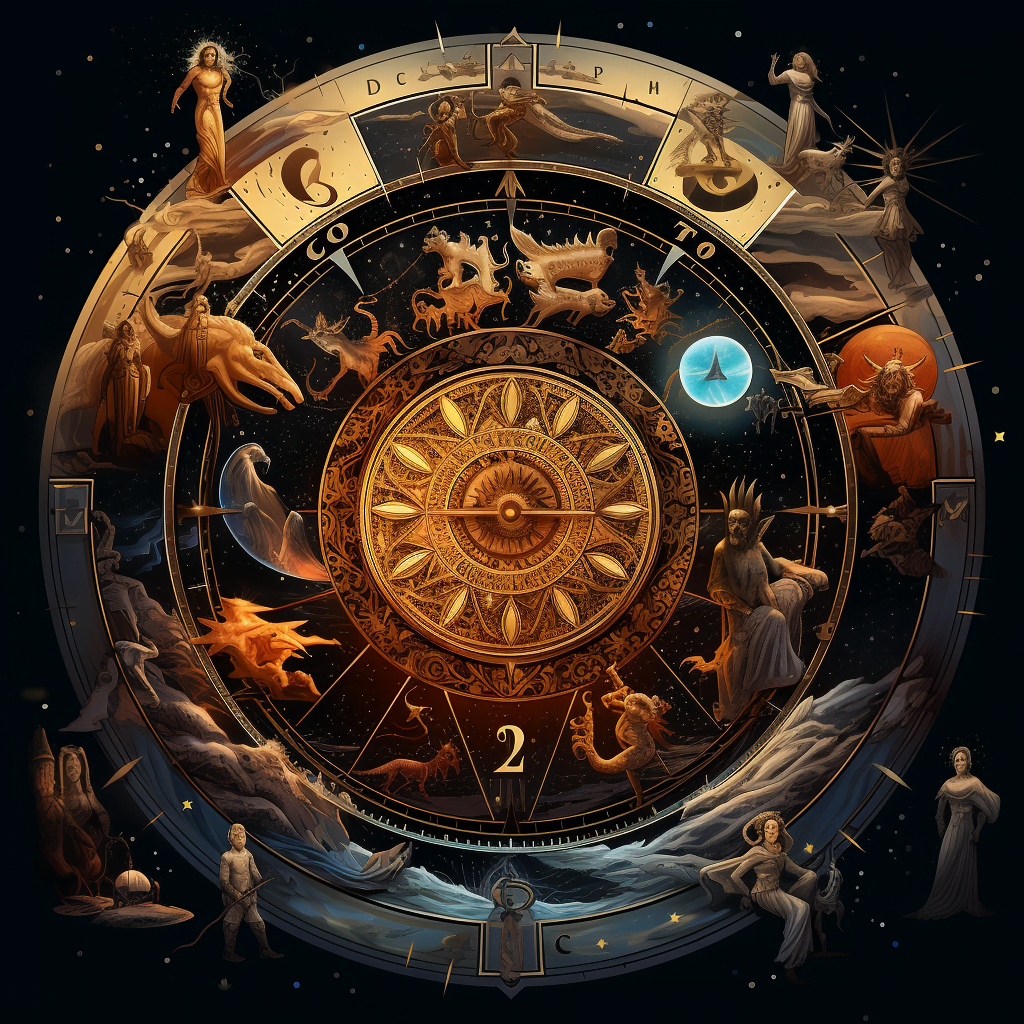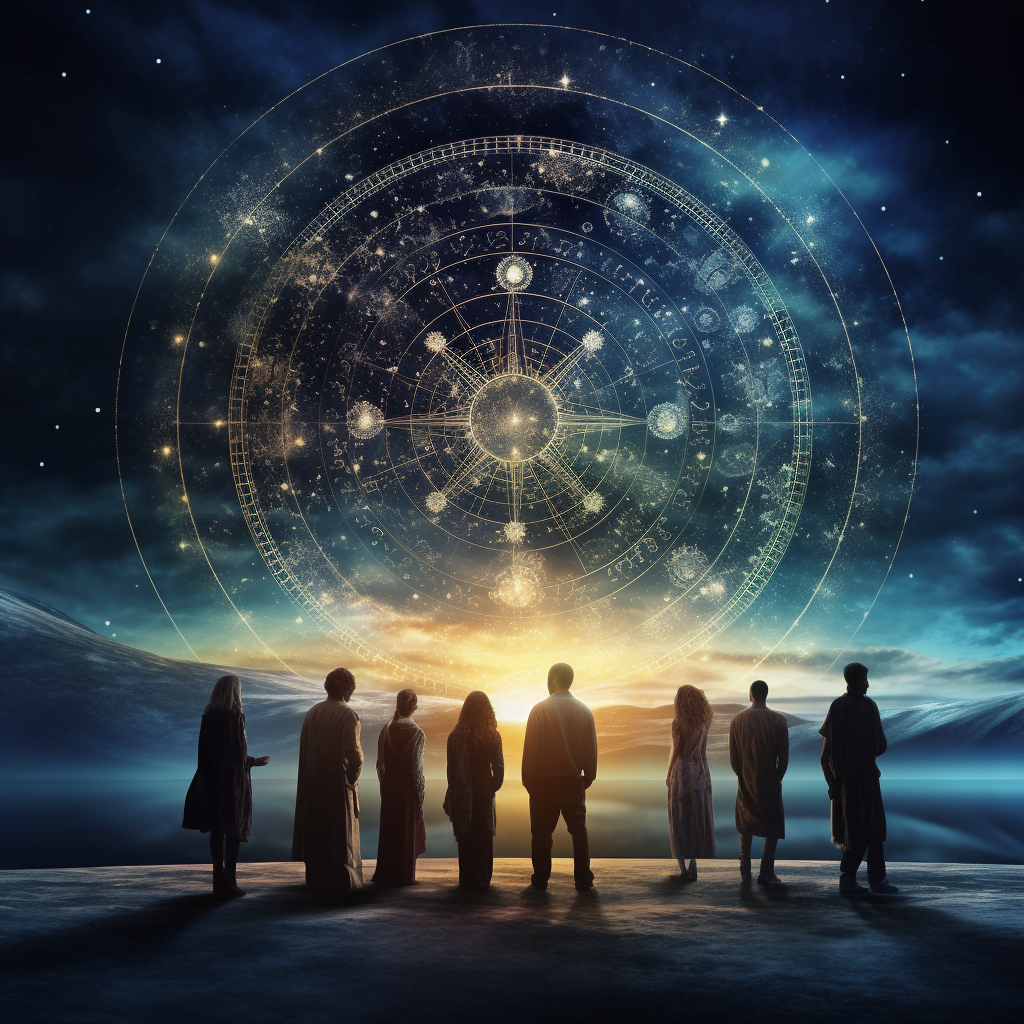I present to you an exploration into the origins of the zodiac, a concept deeply ingrained in human civilization. Astrology, a discipline that has fascinated scholars for centuries, forms the foundation of the zodiac. Through meticulous study and analysis, I shall attempt to unveil the enigmatic beginnings of this celestial phenomenon, shedding light on the profound impact it has had on our perceptions of life and identity. Let us embark upon this journey, unraveling the mysteries of how the zodiac began and the intricate connection between mankind and the stars.
Ancient Beginnings
Throughout history, humanity has sought meaning and guidance in the stars above. The study of astrology, an ancient and intricate system of divination, can be traced back to the ancient civilizations of Mesopotamia, Egypt, and Greece. These civilizations played significant roles in the development and adaptation of astrology, shaping its foundations and influencing its evolution over the centuries.
Mesopotamian Origins
The earliest known records of astrology practices can be found in the ancient civilization of Mesopotamia, which existed around 3000 BCE. Mesopotamian astronomers meticulously observed the night sky, drawing connections between celestial events and earthly occurrences. This early form of astrology focused on understanding and predicting the movements of celestial bodies and their impact on human lives.
Early Astrology Practices
Mesopotamian astrologers observed the positions and movements of celestial bodies, such as the Sun, Moon, and planets, and recorded their findings on clay tablets. They believed that these heavenly bodies held insight into human affairs and could foretell events such as wars, natural disasters, and the fate of individuals. These early practices laid the foundation for the development of astrology as we know it today.
Development of Zodiac Signs
The Mesopotamians discovered that the path of the Sun appeared to pass through certain constellations during different times of the year. They divided this path into twelve equal parts, each associated with a specific constellation. These divisions, known as zodiac signs, provided a framework for understanding the personality traits and destinies of individuals based on their birth dates.
Role of Constellations
Constellations played a significant role in Mesopotamian astrology. The association between specific constellations and zodiac signs allowed astrologers to interpret the influence of celestial bodies on individual lives. Ancient Mesopotamians believed that the movement and positioning of these constellations directly affected human behavior, offering a means to predict and understand the ebb and flow of human existence.
Egyptian Influence
Ancient Egypt also left a lasting impact on the development and interpretation of astrology. The Egyptians saw the stars as woven into the fabric of their culture and spirituality, associating them with their pantheon of gods and goddesses. Their understanding of astrology extended beyond mere divination, encompassing a complex system of religious beliefs and rituals.
Astrology in Ancient Egypt
In ancient Egypt, astrology was deeply intertwined with their religious practices. The pharaohs considered themselves divine and believed that their ancestral deities resided among the stars. Egypt’s prominent priests, who were skilled in celestial observation, used astrology to communicate with the gods and gain insight into the future. The movements and alignments of the stars were believed to hold great significance for the prosperity and well-being of both individuals and the kingdom.
Decoding the Stars and Divinity
Egyptian astrologers carefully tracked the cycles of celestial bodies, seeking to interpret the messages hidden within the stars. For example, the annual flooding of the Nile River held immense importance for Egyptian agriculture and stability. Astrologers identified specific constellations that signaled the imminent flood, allowing preparations to be made. The alignment of stars and planets with gods and goddesses also influenced the religious ceremonies and rituals performed by the priests.
Birth of Zodiac Signs
Egyptian astrology contributed to the development of the zodiac signs we recognize today. They divided the night sky into twelve equal parts, much like the Mesopotamians, but instead associated each division with an animal. These twelve animal signs, such as the lion, bull, or scorpion, became deeply ingrained in Egyptian culture and served as symbols of the gods and their attributes. Over time, the influence of Egyptian astrology would merge with other ancient civilizations, shaping the astrology we know today.
Greek Adaptation
The ancient Greeks, renowned for their pursuit of knowledge and philosophical exploration, built upon the foundations of Mesopotamian and Egyptian astrology. They combined aspects of both systems, integrating them into a unique and influential astrological tradition that left a lasting impact on Western civilization.
Early Greek Astrology
Greek astrology emerged during the 4th century BCE and quickly gained popularity among the scholarly elite. Greek astronomers and philosophers, such as Thales and Pythagoras, contributed to the integration of mathematics and astronomical observations into astrology. This scientific approach added credibility to the astrological system and attracted the attention of prominent thinkers of the time.
Integration of Babylonian and Egyptian Systems
Greek scholars recognized the value and sophistication of the astrological systems developed by the ancient civilizations that preceded them. They integrated Babylonian methods of celestial observation and prediction with the Egyptian understanding of the gods’ influence on human lives. By merging these diverse approaches, they created a comprehensive system of astrology that expanded upon earlier foundations.
Introduction of Zodiac Symbols
During the Hellenistic period, Greek astrologers introduced the use of symbols, known as glyphs, to represent the twelve zodiac signs. These symbols, such as the ram for Aries or the scales for Libra, enhanced the visual appeal and accessibility of astrology. The glyphs have since become iconic representations of the zodiac signs, embedding themselves in Western culture and remaining widely recognized today.
The Hellenistic Period
The Hellenistic period, spanning from the death of Alexander the Great in 323 BCE to the emergence of the Roman Empire in 31 BCE, witnessed a flourishing of Greek astrology. It was during this time that significant advancements in the field were made, solidifying astrology’s influence and expanding its reach.
Greek Astrology Flourishes
The Hellenistic period marked a golden age for Greek astrology, with renowned astrologers like Claudius Ptolemy and Vettius Valens making substantial contributions to the field. Astrology became ingrained in various aspects of society, shaping political decisions, personal choices, and even the planning of important events. The precise calculations and detailed horoscopes produced during this era laid the groundwork for future astrological practices.
Hipparchus’ Discoveries
Hipparchus, a Greek astronomer and mathematician, made significant discoveries during the Hellenistic period that impacted astrology. He was the first to discover the precession of the equinoxes, the slow shift in the alignment of the zodiac with the Earth’s axis. This discovery introduced the concept of the Ages of astrology, where each age is associated with a different zodiac sign, and resulted in a revised understanding of astrological charts and predictions.
Ptolemy and the Almagest
Claudius Ptolemy, a prominent Hellenistic astronomer and astrologer, wrote the influential book “Tetrabiblos” and the comprehensive astronomical treatise “Almagest.” Ptolemy’s contributions to astrology included refining the understanding of celestial movements, exploring the influence of planetary positions, and establishing the importance of accurate chart calculations in astrology. His works became foundational texts, shaping astrological thinking well into the modern era.
Roman Era and Beyond
With the rise of the Roman Empire, astrology spread beyond its Greek roots and found new popularity and applications. The Romans eagerly adopted Greek astrology, incorporating it into their religious practices and seeking guidance from astrologers on matters of personal and state importance.
Roman Adoption of Greek Astrology
The Romans saw the wisdom and practicality of Greek astrology and readily embraced it as a tool for understanding their world. The influence of astrology extended into all aspects of Roman society, from the birth of individuals to significant events such as battles and coronations. Roman astrologers refined and expanded upon the Greek astrological system, leaving their mark on the evolving field.
Proliferation of Zodiac Symbols
During the Roman era, the use of zodiac symbols became even more widespread. These symbols, represented through sculptures, mosaics, and other forms of art, adorned public spaces and private homes. They served as visual reminders of the connection between the gods, the celestial realm, and the lives of individuals. The spread of these symbols mirrored the ever-growing reach and importance of astrology within Roman society.
Spread to Europe and the Arab World
The Roman Empire’s vast influence facilitated the dissemination of astrology throughout Europe and the Arab world. Greek and Roman texts on astrology were translated into various languages, allowing the knowledge and practices of astrology to reach new audiences. In the following centuries, Arabic scholars would greatly contribute to the field, preserving and expanding upon the astrological knowledge of the ancient world.
Middle Ages and Renaissance
The Middle Ages and the subsequent Renaissance period witnessed significant shifts in the understanding and application of astrology. The advent of Christianity, the emergence of new philosophical schools of thought, and the rediscovery of ancient knowledge all played crucial roles in shaping the way astrology was perceived and practiced during this time.
Development of Horoscope Charts
During the Middle Ages, the development of horoscope charts added a new level of complexity and precision to astrology. These charts, often cast for the moment of a person’s birth, plotted the positions of celestial bodies and their aspects to one another. Astrologers believed that these charts provided invaluable insights into an individual’s personality, life events, and future endeavors.
Reinterpretation and Expansion
In an era heavily influenced by the Christian worldview, astrology faced criticism and reinterpretation. Theologians and scholars sought to reconcile astrology with religious doctrine, leading to the emergence of new branches of astrology, such as judicial astrology, which focused on legality and divination. This period also saw the expansion of astrological symbolism and associations, with each planet and zodiac sign acquiring deeper layers of meaning.
Astrological Beliefs in the Renaissance
The Renaissance brought with it a revival of interest in astrology, particularly among the educated elite. Scholars of the time saw astrology as a powerful tool for understanding the world and emphasized the close connection between humans and the cosmos. Astrology gained prominence in the courts of rulers, and prominent figures such as Queen Elizabeth I and King Louis XIV employed astrologers to guide their decisions.
Modern Astrology
From the 19th century onwards, astrology experienced various waves of revival and transformation, adapting to the changing intellectual and cultural climate. It found new proponents and followers and integrated with emerging psychological theories, ultimately gaining popularity beyond its traditional religious and divinatory contexts.
19th-Century Revival
In the 19th century, astrology experienced a resurgence with the rise of spiritual movements and the exploration of Eastern philosophies. The Theosophical Society, founded by Helena Blavatsky, promoted the study of astrology alongside other esoteric subjects, contributing to its resurgence as a legitimate field of inquiry.
Psychological Astrology
The work of Swiss psychologist Carl Jung also left a profound impact on the evolution of astrology. Jung saw astrology as a tool for understanding the complexities of human psychology and persona. He explored the correlations between astrological symbols and archetypes, believing that the planets and zodiac signs are symbolic representations of fundamental aspects of the human psyche.
Popularity in the New Age Movement
In the 20th century, astrology gained popularity within the broader New Age movement. Advocates of holistic spirituality and alternative healing embraced astrology as a means of self-discovery, personal growth, and guidance. Astrology became a staple of popular culture, appearing in countless newspaper horoscopes, books, and online platforms, further cementing its influence in contemporary society.
Scientific Criticisms
Despite its enduring popularity, astrology has faced scrutiny and criticism from the scientific community. Skeptics argue that astrology lacks empirical evidence to support its claims and dismiss it as pseudoscience. Scientific investigations and studies have focused on testing the validity of astrological predictions and examining psychological explanations for why individuals may perceive accuracy in astrological readings.
Testing Astrology’s Validity
Numerous studies have sought to test the accuracy of astrological predictions, often employing rigorous statistical analyses. However, these studies have generally failed to demonstrate consistent and reliable predictive power beyond what would be expected by chance. Critics argue that the effects attributed to astrological factors are primarily due to subjective validation and the Forer effect, where individuals find vague and general descriptions applicable to themselves.
Psychological Explanations
Psychologists propose various psychological mechanisms to explain why individuals may find astrological readings compelling. The Barnum effect suggests that people tend to accept general statements about themselves as highly accurate due to a desire for confirmation and the tendency to interpret information subjectively. Additionally, cognitive biases, such as confirmation bias and hindsight bias, play a role in individuals’ perception of the accuracy of astrological readings.
Position of the Scientific Community
The scientific consensus remains that astrology lacks evidence to substantiate its claims. Astrology does not adhere to the rigorous empirical standards of scientific investigation and is therefore not considered a legitimate science. While some may argue for the psychological or subjective value of astrology, its predictive claims are viewed skeptically within the scientific community.
Contemporary Significance
Despite ongoing scientific criticism, astrology continues to captivate and influence many individuals worldwide. It thrives in various forms, adapting to the modern era and resonating with individuals seeking personal exploration, self-identity, and a sense of connection to larger cosmic forces.
Astrology Today
Astrology remains an integral part of popular culture today, with daily horoscopes available through newspapers, websites, and smartphone apps. Many individuals turn to astrology to gain insight into their personality traits, relationships, and career paths. Astrological consultations and readings offer personalized guidance and interpretations that speak to the complexity and uniqueness of their lives.
Zodiac and Pop Culture
The zodiac signs, with their distinct symbols and characteristics, have permeated pop culture and become widely recognized symbols. Zodiac motifs appear in fashion, jewelry, and art, capturing the imagination of millions. Contemporary astrology-themed memes, social media accounts, and astrology celebrities have also contributed to the continued popularity of astrology, particularly among younger generations.
Personal Exploration and Identity
Astrology’s enduring appeal lies in its ability to offer individuals a sense of purpose, self-discovery, and guidance. Many find comfort and validation in astrological readings, seeing their birth charts as blueprints for self-understanding. Astrology’s capacity to provide a language for discussing and reflecting on personal experiences resonates with those seeking meaning and connection in a complex and ever-changing world.
In conclusion, astrology has a rich and complex history that spans centuries and civilizations. From its origins in Mesopotamia and Egypt, through the Greek adaptation and Roman era, to the Middle Ages, Renaissance, and beyond, astrology has evolved and adapted, merging religious beliefs, scientific observations, and philosophical currents. Despite scientific criticisms, astrology holds significant cultural meaning in the contemporary world, offering individuals guidance, self-reflection, and a sense of belonging in the vast cosmic tapestry.



